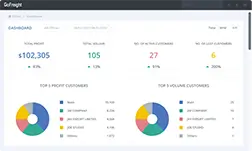TEU (Twenty-foot Equivalent Unit)
What is TEU? The Twenty-foot Equivalent Unit (TEU) is a standard unit of measurement in the freight industry, widely used to describe the capacity of container ships and terminals. One TEU represents the dimensions of a standard twenty-foot container, a universal benchmark for calculating the capacity of cargo vessels and the volume of shipments. TEUs […]
Federal Maritime Commission (FMC)
What is FMC? The Federal Maritime Commission is responsible for regulating shipping traffic coming in and out of the United States. Agents such as freight forwarders or NVOCCs must be registered or licensed with the FMC to be allowed to perform shipping services in the United States. After a freight forwarder/NVOCC has obtained a license […]
Standard Carrier Alpha Code (SCAC)
What is SCAC? The Standard Carrier Alpha Code, or SCAC Code, is a two to four-letter code used to identify vessel operating common carriers (VOCC) in computer systems and shipping documents, such as Freight Bill, Bill of Lading, Packing List, and Purchase Order. SCAC Code can be obtained from the NMFTA. More about SCAC The […]
Pier Pass
What is Pier Pass? Pier Pass, or PierPass, is a not-for-profit organization founded by marine terminal operators at the Los Angeles pier and the Long Beach pier. The main mission of Pier Pass is to mitigate port congestion at these ports. More about Pier Pass and Pier Pass Fee To fulfill its mission, the organization […]
International Air Transport Association (IATA)
What is IATA? The International Air Transport Association (IATA) is a trade association representing more than 290 airlines (82% of all air traffic) across 117+ countries. The association is also known to have been involved with helping create and set industry standards and policies on critical aviation issues like safety, carbon emissions, business practices, etc. […]
International Monetary Fund (IMF)
What is IMF? The International Monetary Fund is an international financial institution that helps facilitate international trade, maintain financial stability, and seek global monetary cooperation. More about IMF Compromised of 190+ member countries, the IMF is headquartered in the Washington D.C. and primarily focuses on overseeing fixed exchange rates, providing short-term capital aid for balance-of-payments, […]
Goods and Services Tax (GST)
What is GST? The Goods and Services Tax (GST) is a value-added tax (VAT) that is levied on goods and services that are used domestically. Currently, around 160 countries have adopted the GST including Canada, Australia, and the United Kingdom. In Brazil and Canada, these countries use a dual GST structure which comprises a federal […]
Fulfillment by Amazon (FBA)
What is FBA? FBA, which stands for Fulfillment by Amazon, is an e-commerce service provided by Amazon that assists sellers to manage their products more efficiently and less troublesomely. More about FBA Once sellers pay for FBA services, they can ship their products to Amazon’s fulfillment centers. Amazon will then take over everything including warehousing, […]
Container Tracking System
What Is a Container Tracking System? A container tracking system provides real-time information on containers using sensors, satellites, and a back-end system providing visibility for different parties, allowing them to take precautionary and proactive measures. They can also use the information to react to unexpected incidents immediately, saving valuable time. How Does the Container Tracking […]
Bill of Lading (BOL)
What is BOL? Bill of lading, or BOL, is a required legally binding document issued by a carrier or their agent in the shipping process. Bill of lading acts as a conclusive receipt for the goods, evidence of the agreed terms, and also the goods’ title of document. With policy of insurance and an invoice […]

